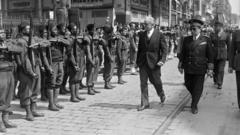France has officially recognized a tragic incident nearly 80 years old, where soldiers from the Tirailleurs Senegalais unit, who had been conscripted to serve during World War II, faced violent repression upon their return to Senegal. This acknowledgment follows an escalation of tension regarding military ties between France and Senegal under the leadership of President Bassirou Diomaye Faye.
On December 1, 1944, soldiers returning from fighting for France faced a dire situation at the Thiaroye military camp, located 15 kilometers from Dakar. As these soldiers began to express discontent about lower wages compared to their French counterparts—an issue that had been festering since their time in France—the situation escalated into protests. While the French military initially reported only 35 soldiers killed during the crackdown, deeper scrutiny and historical reflection have suggested a possible death toll reaching as high as 400.
In a letter to Faye, Macron stated that this tragic encounter was a result of clashes between the soldiers who demanded their rightful wages and the authorities. He emphasized the necessity for France to confront this period’s violent legacy and help facilitate a thorough investigation into the events. Past French leaders, including François Hollande in 2014, had referred to the incident as "bloody repression," but this new statement represents a significant shift in the acknowledgment of responsibility.
Senegal commemorates the 80th anniversary of the Thiaroye shootings this weekend. Faye expressed hope that Macron’s recognition would lead to further disclosures and accountability regarding this event, signaling the beginning of a more collaborative pathway towards reconciling the past. He indicated a desire for a formal apology from France and has pushed for the removal of French military bases in Senegal, reaffirming the nation’s sovereignty and independence.
As discussions continue about the historical context and implications of France's military presence in Africa, the incident at Thiaroye serves as a poignant reminder of the legacies of colonialism and the ongoing need for reparative justice in international relations. The evolving narrative reflects broader tensions and aspirations within post-colonial dynamics, as both countries navigate the complex landscape of their historical relationship.
In an era where colonial histories are increasingly scrutinized, the Thiaroye massacre presents an opportunity for both nations to reassess their ties, fostering a future enriched with mutual respect and understanding.
On December 1, 1944, soldiers returning from fighting for France faced a dire situation at the Thiaroye military camp, located 15 kilometers from Dakar. As these soldiers began to express discontent about lower wages compared to their French counterparts—an issue that had been festering since their time in France—the situation escalated into protests. While the French military initially reported only 35 soldiers killed during the crackdown, deeper scrutiny and historical reflection have suggested a possible death toll reaching as high as 400.
In a letter to Faye, Macron stated that this tragic encounter was a result of clashes between the soldiers who demanded their rightful wages and the authorities. He emphasized the necessity for France to confront this period’s violent legacy and help facilitate a thorough investigation into the events. Past French leaders, including François Hollande in 2014, had referred to the incident as "bloody repression," but this new statement represents a significant shift in the acknowledgment of responsibility.
Senegal commemorates the 80th anniversary of the Thiaroye shootings this weekend. Faye expressed hope that Macron’s recognition would lead to further disclosures and accountability regarding this event, signaling the beginning of a more collaborative pathway towards reconciling the past. He indicated a desire for a formal apology from France and has pushed for the removal of French military bases in Senegal, reaffirming the nation’s sovereignty and independence.
As discussions continue about the historical context and implications of France's military presence in Africa, the incident at Thiaroye serves as a poignant reminder of the legacies of colonialism and the ongoing need for reparative justice in international relations. The evolving narrative reflects broader tensions and aspirations within post-colonial dynamics, as both countries navigate the complex landscape of their historical relationship.
In an era where colonial histories are increasingly scrutinized, the Thiaroye massacre presents an opportunity for both nations to reassess their ties, fostering a future enriched with mutual respect and understanding.



















